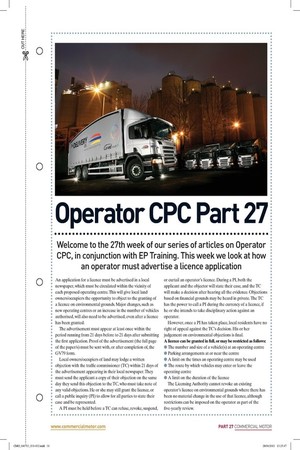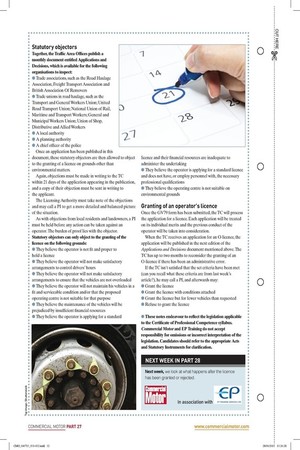Operator CPC Part 27 • • • • • •
Page 25

Page 26

If you've noticed an error in this article please click here to report it so we can fix it.
• • • • • • • • • • • • • • • • • • • • • • • • • • • • • • • • • • • • • • • • • • • • • • • • • • • • • • Welcome to the 27th week of our series of articles on Operator CPC, in conjunction with EP Training. This week we look at how an operator must advertise a licence application An application for a licence must be advertised in a local newspaper, which must be circulated within the vicinity of each proposed operating centre. This will give local land owners/occupiers the opportunity to object to the granting of a licence on environmental grounds. Major changes, such as new operating centres or an increase in the number of vehicles authorised, will also need to be advertised, even after a licence has been granted.
The advertisement must appear at least once within the period running from 21 days before to 21 days after submitting the first application. Proof of the advertisement (the full page of the paper/s) must be sent with, or after completion of the GV79 form.
Local owners/occupiers of land may lodge a written objection with the traffic commissioner (TC) within 21 days of the advertisement appearing in their local newspaper. They must send the applicant a copy of their objection on the same day they send this objection to the TC, who must take note of any valid objections. He or she may still grant the licence, or call a public inquiry (PI) to allow for all parties to state their case and be represented.
A PI must be held before a TC can refuse, revoke, suspend, or curtail an operator's licence. During a PI, both the applicant and the objector will state their case, and the TC will make a decision after hearing all the evidence. Objections based on financial grounds may be heard in private. The TC has the power to call a PI during the currency of a licence, if he or she intends to take disciplinary action against an operator.
However, once a PI has taken place, local residents have no right of appeal against the TC's decision. His or her judgement on environmental objections is final.
A licence can be granted in full, or may be restricted as follows: • The number and size of a vehicle(s) at an operating centre • Parking arrangements at or near the centre • A limit on the times an operating centre may be used • The route by which vehicles may enter or leave the operating centre • A limit on the duration of the licence The Licensing Authority cannot revoke an existing operator's licence on environmental grounds where there has been no material change in the use of that licence, although restrictions can be imposed on the operator as part of the five-yearly review. Statutory objectors Together, the Traffic Area Offices publish a monthly document entitled Applications and Decisions, which is available for the following organisations to inspect: • Trade associations, such as the Road Haulage Association, Freight Transport Association and British Association Of Removers • Trade unions in road haulage, such as the Transport and General Workers Union; United Road Transport Union; National Union of Rail, Maritime and Transport Workers; General and Municipal Workers Union; Union of Shop, Distributive and Allied Workers • A local authority • A planning authority • A chief officer of the police Once an application has been published in this document, these statutory objectors are then allowed to object to the granting of a licence on grounds other than environmental matters.
Again, objections must be made in writing to the TC within 21 days of the application appearing in the publication, and a copy of their objection must be sent in writing to the applicant.
The Licensing Authority must take note of the objections and may call a PI to get a more detailed and balanced picture of the situation.
As with objections from local residents and landowners, a PI must be held before any action can be taken against an operator. The burden of proof lies with the objector. Statutory objectors can only object to the granting of the licence on the following grounds: • They believe the operator is not fit and proper to hold a licence • They believe the operator will not make satisfactory arrangements to control drivers' hours • They believe the operator will not make satisfactory arrangements to ensure that the vehicles are not overloaded • They believe the operator will not maintain his vehicles in a fit and serviceable condition and/or that the proposed operating centre is not suitable for that purpose • They believe the maintenance of the vehicles will be prejudiced by insufficient financial resources • They believe the operator is applying for a standard licence and their financial resources are inadequate to administer the undertaking • They believe the operator is applying for a standard licence and does not have, or employ personnel with, the necessary professional qualifications • They believe the operating centre is not suitable on environmental grounds Granting of an operator's licence Once the GV79 form has been submitted, the TC will process the application for a licence. Each application will be treated on its individual merits and the previous conduct of the operator will be taken into consideration.
When the TC receives an application for an 0-licence, the application will be published in the next edition of the Applications and Decisions document mentioned above. The TC has up to two months to reconsider the granting of an 0-licence if there has been an administrative error.
If the TC isn't satisfied that the set criteria have been met (can you recall what these criteria are from last week's article?), he may call a PI, and afterwards may: • Grant the licence • Grant the licence with conditions attached • Grant the licence but for fewer vehicles than requested • Refuse to grant the licence • These notes endeavour to reflect the legislation applicable to the Certificate of Professional Competence syllabus. Commercial Motor and EP Training do not accept responsibility for omissions or incorrect interpretation of the legislation. Candidates should refer to the appropriate Acts and Statutory Instruments for clarification.









































